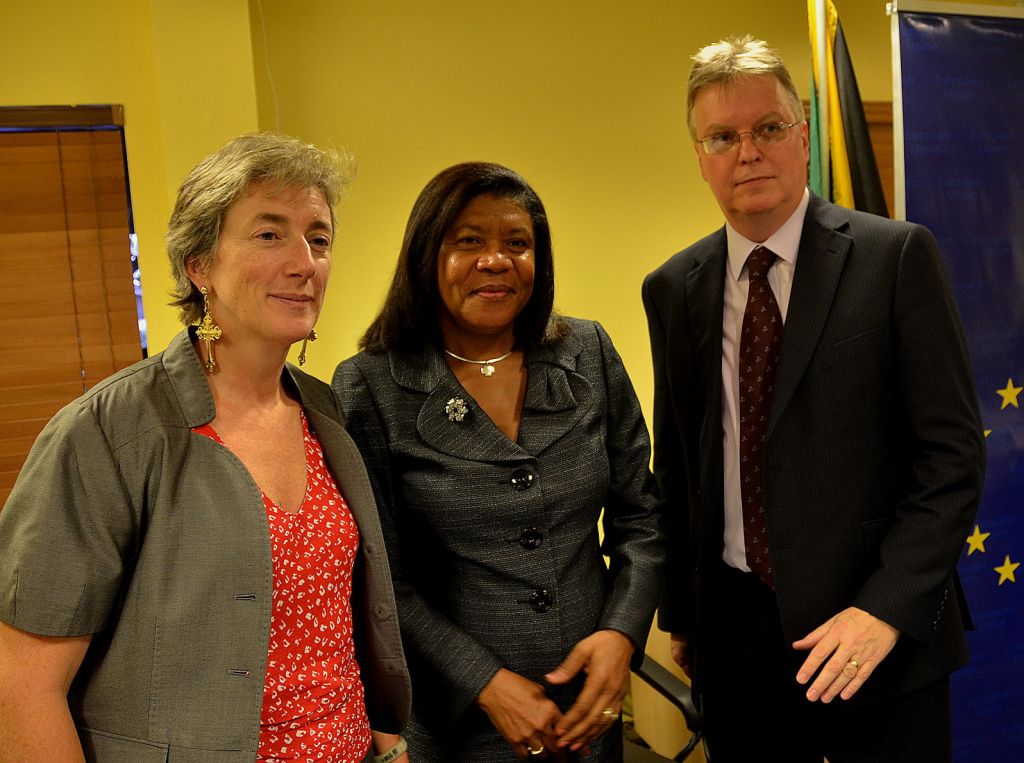EU Provides $52 Million for Justice and Human Rights Projects
By: , October 11, 2013The Key Point:
The Facts
- Chief Justice, Hon. Zaila McCalla, who addressed the launch of the projects on Thursday, October 10, at the British High Commission on Trafalgar Road, praised the initiatives.
- The launch of the projects coincided with the observance of ‘World Day Against the Death Penalty’.
The Full Story
The Delegation of the European Union (EU) in Jamaica has provided some $52 million for the implementation of three projects, focused on the rehabilitation of inmates in the correctional system including juveniles, and addressing legal and human rights issues.
Stand Up for Jamaica (SUFJ) has received a sum of $10.3 million to carry out the ‘Rehabilitation of Inmates: A professional and Artistic Way to Come Back in Society project; Jamaicans for Justice (JFJ) will execute the ‘Combating Impunity By Strengthening Legal Support’ project for $21 million; while the British Council has also benefitted from $21 million to implement the ‘Strengthening the role played by civil society in Jamaica in promoting Human Rights and Democracy’ project.
Chief Justice, Hon. Zaila McCalla, who addressed the launch of the projects on Thursday, October 10, at the British High Commission on Trafalgar Road, hailed the initiatives.
She noted that rehabilitation, legal support, and the involvement of civil society, are useful tools that must be employed to strengthen the justice system in the quest to build a peaceful society.
She said that the rehabilitation of inmates programme in particular, has the potential to have far reaching benefits for the Jamaican society, in terms of reducing recidivism.
She pointed to the latest findings in the Economic and Social Survey, which shows an increase in trend towards persons relapsing into a life of crime after leaving prison. “This development is cause for concern as our correctional facilities are already overcrowded,” she said, noting that this is also a burden on the court system and the wider society.
Justice McCalla also applauded the human rights promotion project, which focuses on strengthening the role played by civil society organisations in promoting human rights and democracy, noting that due to their community-based approach, such groups often enjoy a greater outreach than government agencies.
“Empowering the population with information and education is essential to human rights issues, not just for identifying when human rights abuse exists, but more importantly, the promulgation and promotion of these ideals will discourage the commission of human rights abuses,” the Chief justice argued.
She further noted that the enhancement of legal support is crucial in matters relating to human rights issues as those, who have suffered from abuses are often the most vulnerable, the very young, the elderly and those living with disabilities. These cases sometimes present challenges for those representing persons from these group, she noted.
“I look forward to seeing the fruits of these projects being launched by the (EU) Delegation as we seek to attain a society where all Jamaicans are treated with dignity and fairness,” she stated.
The launch of the projects coincided with the observance of ‘World Day Against the Death Penalty’ which focuses on international action against capital punishment and the promotion of human rights with the ultimate goal of the worldwide abolition of this form of punishment.
Head of the EU Delegation in Jamaica, Ambassador Paola Amadei, said that while the projects do not address capital punishment directly, they will address issues within Jamaica’s correctional services and the justice system and in so doing, contribute to a system, which provides fair treatment of all and aims at rehabilitation, thereby reducing recidivism.
“It is the hope of the EU that by addressing some of the underlying causes for crime and violence, and improving access to and delivery of justice within Jamaica, there can ultimately be a reduction in the perceived need for capital punishment,” she stated.
A number of government representatives, members of the diplomatic corps and civil society groups, attended the launch.




